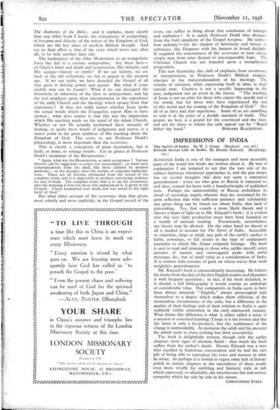IMPRESSIONS OF INDIA
The Spirit of India. By W. J. Grant. (Batsford. sos. 6d.) British Social Life in India. By Dennis Kincaid. (Roudedge. Iss.)
ALTHOUGH India is one of the strangest and most accessible parts of the world few books are written about it. By way of explanation I am tempted to say that the vast size of the subject depresses whomever approaches it, and the pen drops, but on second thoughts this does not seem a warranted generalisation : every ass who goes to Russia is expected to, and does, reward his hosts with a hundredweight of published tosh. Perhaps the unknowability of Russia emboldens its cloud of recording angels, whereas they are restrained by the grim reflection that with sufficient patience and scholarship any given thing can be found out about India, that land of painstaking. Yes, that sounds a more likely theory and it throws a beam of light on to Mr. Kincaid's book ; it is evident that this very light production must have been founded on a wealth of unusual reading. Precariously, nevertheless, my theory may be allowed. On the other hand no theory at all is needed to account for The Spirit of India. Accessible or otherwise, large or small, any part of the earth's surface is liable, nowadays, to fall victim to the type of enthusiastic journalist to which Mr. Grant evidently belongs. His book is easy to read and amusing to those who, unlike myself, enjoy pictures of sunsets and snowcapped peaks with awful messages, &c., but of small value as a consideration of India. It is written with torrents of gush on whose waves float weak weightless generalisations.
Mr. Kincaid's book is extraordinarily interesting. He follows his theme from the days of the first English traders and illustrates it with frequent 'quotation ; in fact, if his book included, as it should, a full bibliography it would contain an anthology of considerable value. Our compatriots in India seem to have been always intensely "English," always preoccupied with themselves to a degree which makes them oblivious of the tremendous circumstance of the exile, but a difference in the quality of their feelings and of their relation to India is quite suddenly visible somewhen in the early nineteenth century. What forms this difference is what is either called a sense of a mission or conceited humbug (I hope it is the former and that the latter is only a by-product), but the suddenness of the change is unmistakable. At moments the sahib and his ancestor the nabob seem to share nothing but their eccentricity.
The book is delightfully written, though only the earlier chapters show signs of absolute finish : thus much the book suffers from the author's death. Dennis Kincaid was a man who excelled in humorous conversation and he had the rare gift of being able to reproduce his voice and manner in what he wrote. So perhaps it is foolish to regret some lack of literary polish in certain chapters as the naturalness of these recalls even more vividly his rambling and fantastic style in talk which expressed, so admirably, the mischievous fun and serious sympathy which lay side by side in his nature.
CHRISTOPHER SYICES.










































 Previous page
Previous page